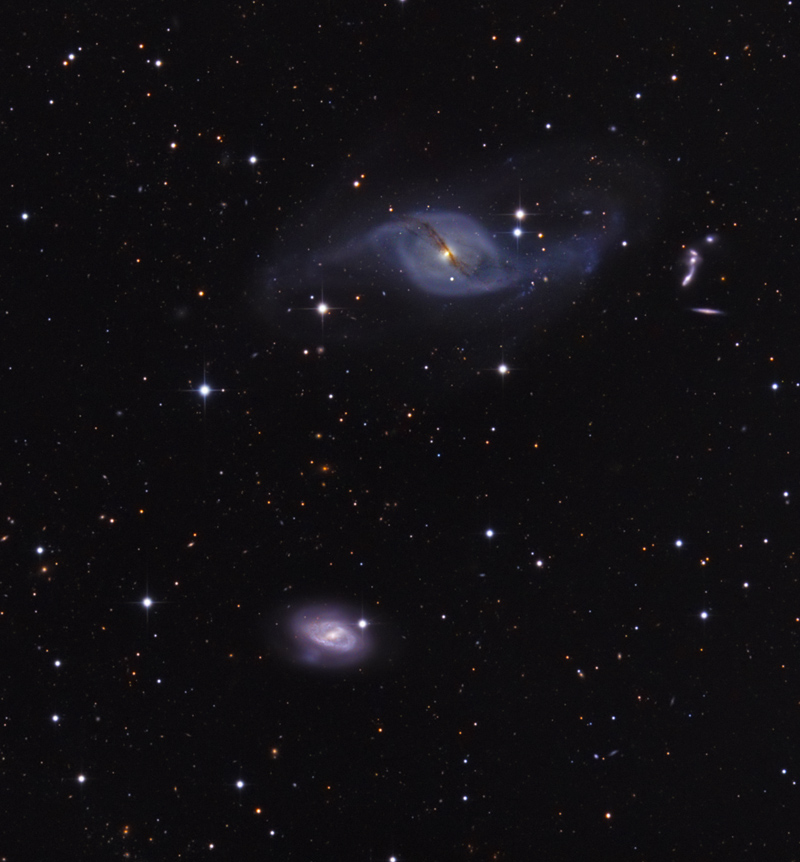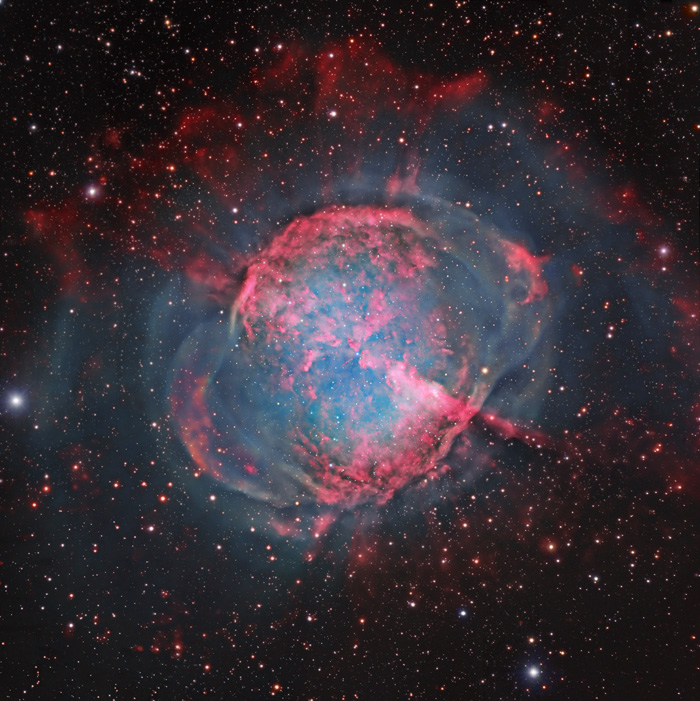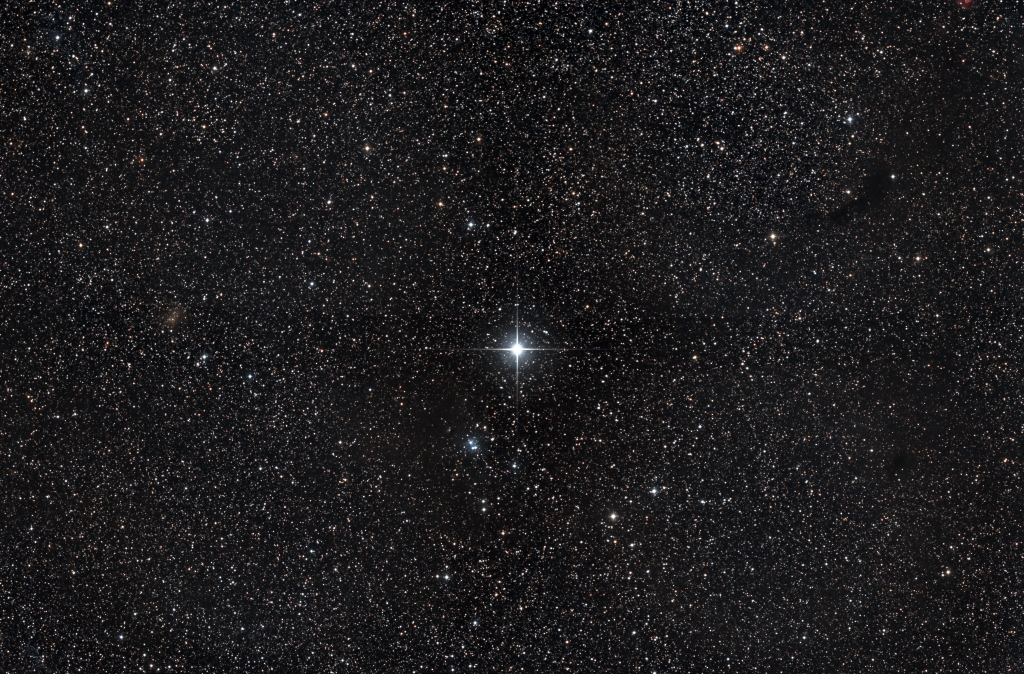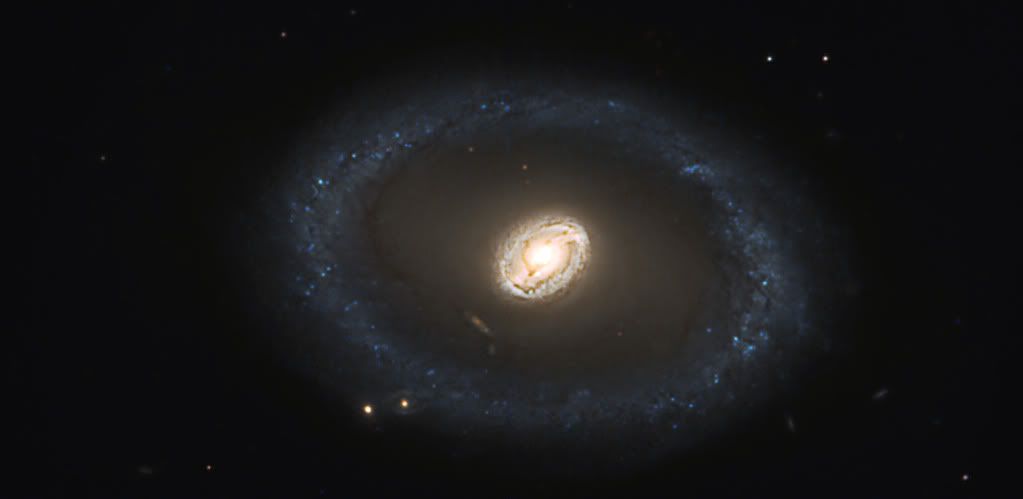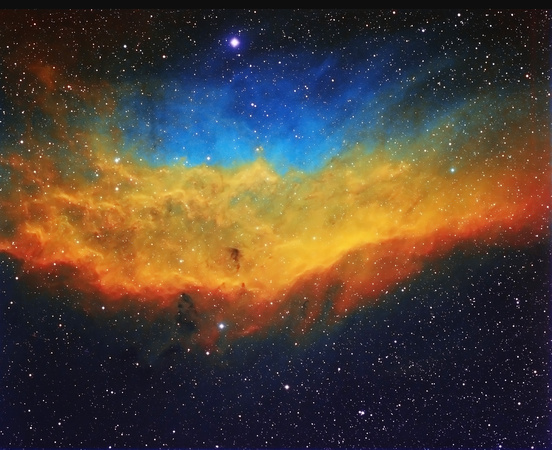Recent Submissions: 2012 February 11-16
-
Efrain Morales
- Commander
- Posts: 510
- Joined: Fri Oct 22, 2010 8:15 pm
- AKA: Jaicoa
- Location: Aguadilla, Puerto Rico
- Contact:
Recent Submissions: 2012 February 11-16
________________________________________________________________________________________
<- Previous submissions
_______________________________________________________________________________________
Mars from the 6th of february. Top Propontis Complex (Polar) region, Mid Amazonis,Cerberus region, Bot. Mare Cimmerium region (Spirit). Images taken one hour apart. Note: Sit back (2ft +) and simply cross your Eyes for a 3D effect (if you can) Enjoy!.
Equipment: LX200ACF 12 in. OTA, F30, CGE mount, PGR Flea3 Ccd, TeleVue 3x barlows, Astronomik Ir, RGB filter set. My Latest session from the 11th, February showing some activities at the North polar Cap region and a possible dust storm or receding ice albedos and Oragraphic clouds at Olympus Mons basin and Tharsis region at the limb.
<- Previous submissions
_______________________________________________________________________________________
Mars from the 6th of february. Top Propontis Complex (Polar) region, Mid Amazonis,Cerberus region, Bot. Mare Cimmerium region (Spirit). Images taken one hour apart. Note: Sit back (2ft +) and simply cross your Eyes for a 3D effect (if you can) Enjoy!.
Equipment: LX200ACF 12 in. OTA, F30, CGE mount, PGR Flea3 Ccd, TeleVue 3x barlows, Astronomik Ir, RGB filter set. My Latest session from the 11th, February showing some activities at the North polar Cap region and a possible dust storm or receding ice albedos and Oragraphic clouds at Olympus Mons basin and Tharsis region at the limb.
Last edited by owlice on Sat Feb 18, 2012 11:13 am, edited 7 times in total.
Reason: Added link to previous submissions
Reason: Added link to previous submissions
Re: Recent Submissions: 2012 February 11-
NGC3718 NGC3729
Copyright: Wolfgang Promper http://www.astro-pics.com/3718plm.htm
Copyright: Wolfgang Promper http://www.astro-pics.com/3718plm.htm
-
Marco Angelini
- Ensign
- Posts: 40
- Joined: Sat Jan 07, 2012 12:44 am
Re: Recent Submissions: 2012 February 11-
NGC 2264 Open Cluster - The Fox Fur & the Cone Nebulae
http://www.astrobrallo.com/gallery/inde ... nitiva-WEB
Marco Angelini - Fabio Tagliani - Francesco Antonucci. ADARA Brallo
[attachment=0]marco.jpg[/attachment]
http://www.astrobrallo.com/gallery/var/ ... va-WEB.png
http://www.astrobrallo.com/gallery/inde ... nitiva-WEB
Marco Angelini - Fabio Tagliani - Francesco Antonucci. ADARA Brallo
[attachment=0]marco.jpg[/attachment]
http://www.astrobrallo.com/gallery/var/ ... va-WEB.png
Last edited by owlice on Sun Feb 12, 2012 6:49 am, edited 1 time in total.
Reason: Attached smaller image for faster downloading; left link to larger image. Thanks for sharing!
Reason: Attached smaller image for faster downloading; left link to larger image. Thanks for sharing!
-
davidebardini
- Ensign
- Posts: 16
- Joined: Tue Oct 05, 2010 10:40 pm
Re: Recent Submissions: 2012 February 11-
Two shots for many galaxies...
The star Phad / Phecda (γUMa) NGC 3992 / M 109, NGC 3953 and others: http://www.astrosky.it/imagebig.php?big=345 NGC 4258 / M 106, NGC 4217, NGC 4220, NGC 4248, NGC 4288 & companions: http://www.astrosky.it/imagebig.php?big=344 thanks for viewing!
Davide Bardini
www.astrosky.it
The star Phad / Phecda (γUMa) NGC 3992 / M 109, NGC 3953 and others: http://www.astrosky.it/imagebig.php?big=345 NGC 4258 / M 106, NGC 4217, NGC 4220, NGC 4248, NGC 4288 & companions: http://www.astrosky.it/imagebig.php?big=344 thanks for viewing!
Davide Bardini
www.astrosky.it
Re: Recent Submissions: 2012 February 11-
Hello @ all,
my name is Markus Noller and I´m new here on Starship Asterisk. I like to introduce my latest image, taken on 03.-05. Feb. 2012 at my home in south Germany. IC405, the flaming star. Total exposure time was 780min.
[attachment=0]flamingstar.jpg[/attachment]
http://www.deep-sky-images.de/albums/us ... 5forum.jpg
Link to a larger version (ca. 2 MB):
http://www.deep-sky-images.de/albums/us ... 5klein.jpg
Thanks.
Markus
http://www.deep-sky-images.de
my name is Markus Noller and I´m new here on Starship Asterisk. I like to introduce my latest image, taken on 03.-05. Feb. 2012 at my home in south Germany. IC405, the flaming star. Total exposure time was 780min.
[attachment=0]flamingstar.jpg[/attachment]
http://www.deep-sky-images.de/albums/us ... 5forum.jpg
Link to a larger version (ca. 2 MB):
http://www.deep-sky-images.de/albums/us ... 5klein.jpg
Thanks.
Markus
http://www.deep-sky-images.de
Last edited by etalon on Sun Feb 12, 2012 8:57 pm, edited 2 times in total.
Re: Recent Submissions: 2012 February 11-
M81 and M82 with IFN background
http://www.astrogades.es/index.php?nodo ... ure&id=721
Copyright: Jesús Vargas (Astrogades) & Maritxu Poyal (Maritxu) NGC 7184: Spiral Galaxy in Aquarius
http://www.caelumobservatory.com/gallery/n7184.shtml
Copyright: Adam Block/Mount Lemmon SkyCenter/University of Arizona Jupiter and Ganymede
http://www.astrovox.gr/forum/album_pic.php?pic_id=14321
Copyright: Manos Kardasis
[attachment=2]Jup&Gan_2011-12-02_MKardasis.jpg[/attachment]
M27: The Dumbbell Nebula in Vulpecula
http://www.robgendlerastropics.com/M27- ... T-BYU.html
Copyright: Robert Gendler, Subaru Telescope (NAOJ), Michael Joner and David Laney (BYU)
Based on observations made with the NASA/ESA Hubble Space Telescope, and obtained from the Hubble Legacy Archive, which is a collaboration between the Space Telescope Science Institute (STScI/NASA), the Space Telescope European Coordinating Facility (ST-ECF/ESA) and the Canadian Astronomy Data Centre (CADC/NRC/CSA). Star Trails Panorama
Copyright and Credit: Juan Carlos Casado and Daniel Padron, photos; Juan Carlos Casado, processing
[attachment=1]ot-startrails.jpg[/attachment]
Six Eyes Watching to the Sky
http://www.iram-institute.org
Copyright: IRAM (Institute for Millimeter Radio Astronomy)
[attachment=0]Interferometreduplateaudebure.jpg[/attachment]
http://www.astrogades.es/index.php?nodo ... ure&id=721
Copyright: Jesús Vargas (Astrogades) & Maritxu Poyal (Maritxu) NGC 7184: Spiral Galaxy in Aquarius
http://www.caelumobservatory.com/gallery/n7184.shtml
Copyright: Adam Block/Mount Lemmon SkyCenter/University of Arizona Jupiter and Ganymede
http://www.astrovox.gr/forum/album_pic.php?pic_id=14321
Copyright: Manos Kardasis
[attachment=2]Jup&Gan_2011-12-02_MKardasis.jpg[/attachment]
M27: The Dumbbell Nebula in Vulpecula
http://www.robgendlerastropics.com/M27- ... T-BYU.html
Copyright: Robert Gendler, Subaru Telescope (NAOJ), Michael Joner and David Laney (BYU)
Based on observations made with the NASA/ESA Hubble Space Telescope, and obtained from the Hubble Legacy Archive, which is a collaboration between the Space Telescope Science Institute (STScI/NASA), the Space Telescope European Coordinating Facility (ST-ECF/ESA) and the Canadian Astronomy Data Centre (CADC/NRC/CSA). Star Trails Panorama
Copyright and Credit: Juan Carlos Casado and Daniel Padron, photos; Juan Carlos Casado, processing
[attachment=1]ot-startrails.jpg[/attachment]
Six Eyes Watching to the Sky
http://www.iram-institute.org
Copyright: IRAM (Institute for Millimeter Radio Astronomy)
[attachment=0]Interferometreduplateaudebure.jpg[/attachment]
A closed mouth gathers no foot.
-
terry.hancock
- Ensign
- Posts: 97
- Joined: Sat Jul 17, 2010 4:38 am
Re: Recent Submissions: 2012 February 11-
Hello,
here my bicolor version of the rosette:
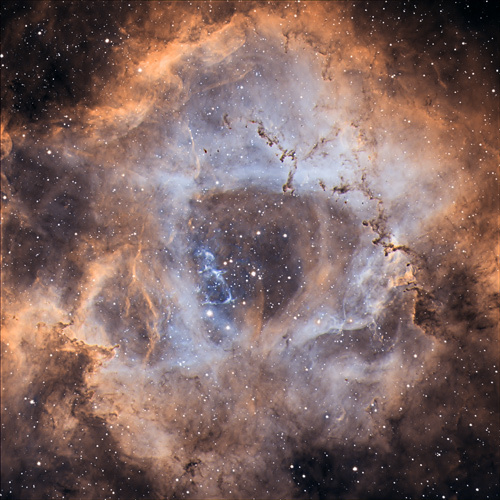
Full resolution 3MB: http://www.astronomieclub-volkach.de/De ... tte_V1.jpg
here my bicolor version of the rosette:

Full resolution 3MB: http://www.astronomieclub-volkach.de/De ... tte_V1.jpg
-
cybermystic99
Recent Submissions: 2012 February 11-
A 4.26 x 2.80 degree region around the star Caph in Cassiopeia.
Copyright Greg Parker 2012
Copyright Greg Parker 2012
- mexhunter
- Science Officer
- Posts: 467
- Joined: Tue Apr 27, 2010 1:41 pm
- AKA: César Cantú
- Location: Monterrey, Mexico.
- Contact:
Re: Recent Submissions: 2012 February 11-
More of 500,000 kilometers
Copyright: César Cantú
Besides the solar prominence below, the Sun of this day presents a filament coupled to another prominence, (top left), which at least is about 320,000 miles. That afternoon the seeing was not very good. Coronado BF30 double stracker Telescope and DMK31 camera, processed in Registax 6.0 and Photoshop CS5.
Also: http://www.astrophoto.com.mx/picture.ph ... category/6
Copyright: César Cantú
Besides the solar prominence below, the Sun of this day presents a filament coupled to another prominence, (top left), which at least is about 320,000 miles. That afternoon the seeing was not very good. Coronado BF30 double stracker Telescope and DMK31 camera, processed in Registax 6.0 and Photoshop CS5.
Also: http://www.astrophoto.com.mx/picture.ph ... category/6
I come to learn and to have fun.
-
chapdelaine
- Ensign
- Posts: 14
- Joined: Sat Jan 14, 2012 6:25 pm
Re: Recent Submissions: 2012 February 11-
NGC 3081, galaxy in Hydra
http://i1267.photobucket.com/albums/jj5 ... 3081_2.jpg
Copyright: Based on observations made with the NASA/ESA Hubble Space Telescope, and obtained from the Hubble Legacy Archive, which is a collaboration between the Space Telescope Science Institute (STScI/NASA), the Space Telescope European Coordinating Facility (ST-ECF/ESA) and the Canadian Astronomy Data Centre (CADC/NRC/CSA). Processing Gilles Chapdelaine
http://i1267.photobucket.com/albums/jj5 ... 3081_2.jpg
Copyright: Based on observations made with the NASA/ESA Hubble Space Telescope, and obtained from the Hubble Legacy Archive, which is a collaboration between the Space Telescope Science Institute (STScI/NASA), the Space Telescope European Coordinating Facility (ST-ECF/ESA) and the Canadian Astronomy Data Centre (CADC/NRC/CSA). Processing Gilles Chapdelaine
Re: Recent Submissions: 2012 February 11-
h Persei (NGC 869) und Chi Persei (NGC 884)
copyright: Ivo Tschager
http://www.sterntor.net/galerie.htm
copyright: Ivo Tschager
http://www.sterntor.net/galerie.htm
Re: Recent Submissions: 2012 February 11-
My name is Mike Brady and I just joined the site. I thought I would submit a couple of my most recent photo's in the hopes that I might eventually get one selected for the APOD.
IC 405 - The Flaming Star Nebula Rosette final 3 M42-The Great Orion Nebula and NGC 1975 (blue reflection nebula)
IC 405 - The Flaming Star Nebula Rosette final 3 M42-The Great Orion Nebula and NGC 1975 (blue reflection nebula)
Last edited by bystander on Tue Feb 14, 2012 8:17 pm, edited 1 time in total.
Reason: replaced page links with image links
Reason: replaced page links with image links
-
Paul Haese
- Ensign
- Posts: 80
- Joined: Tue Feb 01, 2011 10:38 pm
-
bladerunner
- Asternaut
- Posts: 6
- Joined: Sat Aug 06, 2011 2:14 pm
Re: Recent Submissions: 2012 February 11-
Tulip Nebula Narrowband
FSQ106
FSQ106
-
bladerunner
- Asternaut
- Posts: 6
- Joined: Sat Aug 06, 2011 2:14 pm
Re: Recent Submissions: 2012 February 11-
California Nebula
Modified HST
Modified HST
Re: Recent Submissions: 2012 February 11-
Gemini to Auriga Milky Way
http://www.astropix.com
Copyright 2011 Jerry Lodriguss

Click on the image to see a higher resolution version with more information.
http://www.astropix.com
Copyright 2011 Jerry Lodriguss
Click on the image to see a higher resolution version with more information.
-
nicola montecchiari
- Ensign
- Posts: 64
- Joined: Tue Sep 14, 2010 3:14 pm
- Location: Milano, Italy
- Contact:
Re: Recent Submissions: 2012 February 11-
G65.2+5.7 Supernova Remnant in Cygnus
Website: http://www.skymonsters.net
Copyright: Nicola Montecchiari
Website: http://www.skymonsters.net
Copyright: Nicola Montecchiari
Last edited by owlice on Wed Feb 15, 2012 11:51 am, edited 1 time in total.
Reason: Changed img tag to img2 tag; thanks for sharing!
Reason: Changed img tag to img2 tag; thanks for sharing!
Re: Recent Submissions: 2012 February 11-
Re: Recent Submissions: 2012 February 11-
NGC 2359 - Thor's Helmet in LRGB
http://cntastro.smugmug.com/Astrophotog ... 376_VS247W
Copyright: 2012 Craig & Tammy Temple
http://cntastro.smugmug.com/Astrophotog ... 376_VS247W
Copyright: 2012 Craig & Tammy Temple
Re: Recent Submissions: 2012 February 11-
Arp 283 (NGC 2798/2799): Double Galaxies with Infall and Attraction
http://www.caelumobservatory.com/gallery/n2798.shtml
Copyright: Adam Block/Mount Lemmon SkyCenter/University of Arizona
http://www.caelumobservatory.com/gallery/n2798.shtml
Copyright: Adam Block/Mount Lemmon SkyCenter/University of Arizona
A closed mouth gathers no foot.
Re: Recent Submissions: 2012 February 11-
It is belatedly time for me to at least start my comment post. As usual, there are a lot of great images here! 
I'm going to start with Adam Block this time, because he has two images here, and he is one of my great images because of his fantastic dedication to imaging the sky. If you want to see a nice RGB image of a celestial object, chances are that Adam has photographed it and posted his images for us to see.
Adam's image of handsome galaxy NGC 7184 is up to his usual standard. The galaxy appears to be barred and present its bar to us end on. Note the two dust lanes that appear to connect the obvious ring structure with the bright nuclear region. Such dust lanes are typical of bars. Note, too, the slightly pinkish hue of the ring, which suggests that relatively widespread star formation is going on here.
While the portrait of NGC 7184 is handsome and interesting, Adam's image of interacting galaxies NGC 2798/2799 is stunning. Galaxy NGC 2799 appears to be plunging headlong into the nuclear region of larger galaxy NGC 2798. During its fall, NGC 2799 has set off a fantastic starburst activity. What is not brilliantly blue in this galaxy is brilliantly pink from huge emission nebulae. Possibly we can see where the center is in this galaxy, since there appears to be a sort of brightening and thickening of the galaxy on both sides of the brightest pink knots in it. In this thickening, we are indeed probably seeing a non-blue and a non-pink population. It is probably the bulge of this galaxy, dominated by an intermediate population.
As it plunges towards NGC 2798, NGC 2799 has probably already managed to dump a lot of gas straight into the central parts of the larger galaxy. NGC 2798 has reacted by setting off a tremendous starburst in its central area. Note the incredible large pink knots to the upper left of the nucleus. Note how brownish filaments of dust are either plunging straight into the nucleus of NGC 2798 or else being flung up from the nuclear area. Perhaps both things are going on at once.
Note, too, that the "body" of NGC 2798 is intermediate in color. Little or no star formation has been going on in the disk in NGC 2798 for a long time. This galaxy was probably on its way to settling down, when it encountered the interloper NGC 2799. What an incredible encounter!
Finally, note the blue galaxy UGC 4904 to the left of the interacting pair. This magnitude 15.2 galaxy sported magnitude 13.8 supernova 2006jc a few years ago.
Let's continue with the galactic theme! Wolfgang Promper has submitted a very fine image of the fascinating galactic pair, NGC 3718 and NGC 3729. NGC 3718 is the large, blue, diaphanous galaxy. Everything in it is delicate and transparent except for the dust lane. Two arms appear to extend from the dust lane and point "straight and unbendingly" to the lower left and upper right. Note the fantastic group of distant interacting galaxies to the right of NGC 3718.
Davide Bardini has submitted two very fine "galaxy field" images. I particularly like the first one. I like the brightness (and the fine blue color!) of the star Phecda, gamma Ursa Majoris, an A0 type of star a little more than 80 light years away. How nicely it contrasts with fine spiral galaxies M109, about 70 million light years away, and NGC 3953, about 64 million light-years away.
Jesús Vargas and Maritxu Poyal have submitted a fine image of M81 and M82, with some fantastically red Ha emission from M82 and a lot of intergalactic gas and dust. Terry Hancock has made a similar portrait, which brings out the large golden bulge and silvery arms of M82.
cybermystic99 has made a portrait of the field around bright star Caph in Cassiopeia. The picture doesn't look like all that much, until you enlarge it and find elusive, dust-reddened, starbursting nearby dwarf galaxy IC 10 as a reddish smudge at center left. Fantastic!
Finally, chapdelaine has processed data collected by ESA/Hubble and produced a very fine picture of galaxy NGC 3081 in Hydra. Note the bright yellow nucleus and inner yellow lens, which appear to contain a bar. Note the bright ring around this yellow nucleus and lens. Note the fantastic, faint, delicate, transparent yellow oval outside it, and the brighter blue "oval ring" outside the faint yellow oval. What a fantastic galaxy!
And now I'm afraid I have no more time, so I'll have to come back later.
Ann
I'm going to start with Adam Block this time, because he has two images here, and he is one of my great images because of his fantastic dedication to imaging the sky. If you want to see a nice RGB image of a celestial object, chances are that Adam has photographed it and posted his images for us to see.
Adam's image of handsome galaxy NGC 7184 is up to his usual standard. The galaxy appears to be barred and present its bar to us end on. Note the two dust lanes that appear to connect the obvious ring structure with the bright nuclear region. Such dust lanes are typical of bars. Note, too, the slightly pinkish hue of the ring, which suggests that relatively widespread star formation is going on here.
While the portrait of NGC 7184 is handsome and interesting, Adam's image of interacting galaxies NGC 2798/2799 is stunning. Galaxy NGC 2799 appears to be plunging headlong into the nuclear region of larger galaxy NGC 2798. During its fall, NGC 2799 has set off a fantastic starburst activity. What is not brilliantly blue in this galaxy is brilliantly pink from huge emission nebulae. Possibly we can see where the center is in this galaxy, since there appears to be a sort of brightening and thickening of the galaxy on both sides of the brightest pink knots in it. In this thickening, we are indeed probably seeing a non-blue and a non-pink population. It is probably the bulge of this galaxy, dominated by an intermediate population.
As it plunges towards NGC 2798, NGC 2799 has probably already managed to dump a lot of gas straight into the central parts of the larger galaxy. NGC 2798 has reacted by setting off a tremendous starburst in its central area. Note the incredible large pink knots to the upper left of the nucleus. Note how brownish filaments of dust are either plunging straight into the nucleus of NGC 2798 or else being flung up from the nuclear area. Perhaps both things are going on at once.
Note, too, that the "body" of NGC 2798 is intermediate in color. Little or no star formation has been going on in the disk in NGC 2798 for a long time. This galaxy was probably on its way to settling down, when it encountered the interloper NGC 2799. What an incredible encounter!
Finally, note the blue galaxy UGC 4904 to the left of the interacting pair. This magnitude 15.2 galaxy sported magnitude 13.8 supernova 2006jc a few years ago.
Let's continue with the galactic theme! Wolfgang Promper has submitted a very fine image of the fascinating galactic pair, NGC 3718 and NGC 3729. NGC 3718 is the large, blue, diaphanous galaxy. Everything in it is delicate and transparent except for the dust lane. Two arms appear to extend from the dust lane and point "straight and unbendingly" to the lower left and upper right. Note the fantastic group of distant interacting galaxies to the right of NGC 3718.
Davide Bardini has submitted two very fine "galaxy field" images. I particularly like the first one. I like the brightness (and the fine blue color!) of the star Phecda, gamma Ursa Majoris, an A0 type of star a little more than 80 light years away. How nicely it contrasts with fine spiral galaxies M109, about 70 million light years away, and NGC 3953, about 64 million light-years away.
Jesús Vargas and Maritxu Poyal have submitted a fine image of M81 and M82, with some fantastically red Ha emission from M82 and a lot of intergalactic gas and dust. Terry Hancock has made a similar portrait, which brings out the large golden bulge and silvery arms of M82.
cybermystic99 has made a portrait of the field around bright star Caph in Cassiopeia. The picture doesn't look like all that much, until you enlarge it and find elusive, dust-reddened, starbursting nearby dwarf galaxy IC 10 as a reddish smudge at center left. Fantastic!
Finally, chapdelaine has processed data collected by ESA/Hubble and produced a very fine picture of galaxy NGC 3081 in Hydra. Note the bright yellow nucleus and inner yellow lens, which appear to contain a bar. Note the bright ring around this yellow nucleus and lens. Note the fantastic, faint, delicate, transparent yellow oval outside it, and the brighter blue "oval ring" outside the faint yellow oval. What a fantastic galaxy!
And now I'm afraid I have no more time, so I'll have to come back later.
Ann
Color Commentator
Re: Recent Submissions: 2012 February 11-
NGC7000 AND IC5070
Copyright: Joe (sullij1) Sullivan

NGC7000 AND IC5070 by Sullij1, on Flickr
North America Nebula (NGC 7000) spans about 50 light years and lies about 1,500 light years away toward the constellation of the Swan (Cygnus). The North America Nebula is large, covering an area of more than four times the size of the full moon; but its surface brightness is low, so normally it cannot be seen with the unaided eye. The North America Nebula and the nearby Pelican Nebula, (IC 5070) are in fact parts of the same interstellar cloud of ionized hydrogen (H II region). Between the Earth and the nebula complex lays a band of interstellar dust that absorbs the light of stars and nebulae behind it, and thereby determines the shape as we see it.
Copyright: Joe (sullij1) Sullivan

NGC7000 AND IC5070 by Sullij1, on Flickr
North America Nebula (NGC 7000) spans about 50 light years and lies about 1,500 light years away toward the constellation of the Swan (Cygnus). The North America Nebula is large, covering an area of more than four times the size of the full moon; but its surface brightness is low, so normally it cannot be seen with the unaided eye. The North America Nebula and the nearby Pelican Nebula, (IC 5070) are in fact parts of the same interstellar cloud of ionized hydrogen (H II region). Between the Earth and the nebula complex lays a band of interstellar dust that absorbs the light of stars and nebulae behind it, and thereby determines the shape as we see it.
-
davidebardini
- Ensign
- Posts: 16
- Joined: Tue Oct 05, 2010 10:40 pm
Re: Recent Submissions: 2012 February 11-
Thank you Ann for you appreciation.
I've quite a lot of data to process.....
To the next!
D
I've quite a lot of data to process.....
To the next!
D


